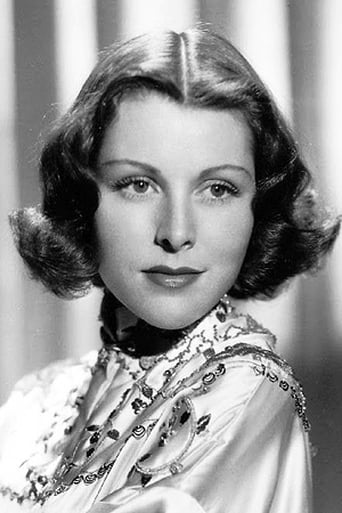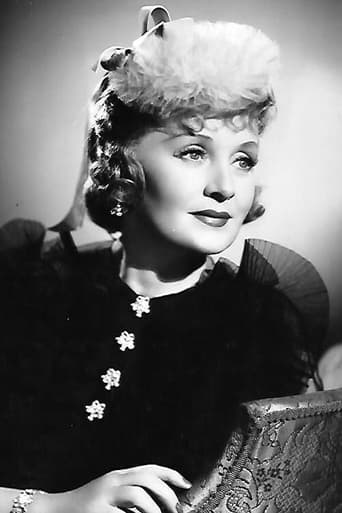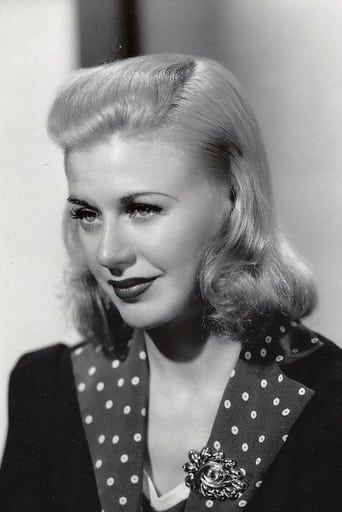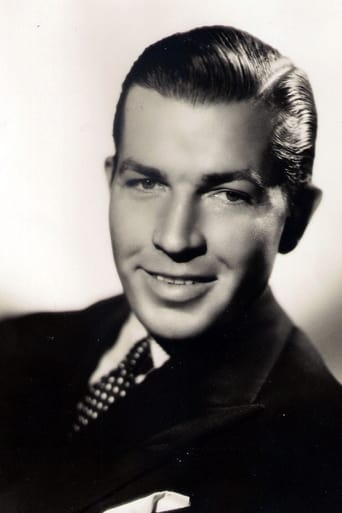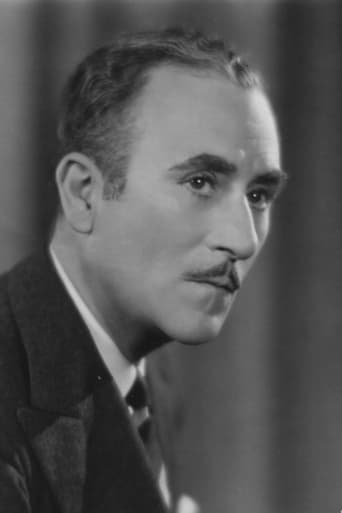Inclubabu
Plot so thin, it passes unnoticed.
Phonearl
Good start, but then it gets ruined
SparkMore
n my opinion it was a great movie with some interesting elements, even though having some plot holes and the ending probably was just too messy and crammed together, but still fun to watch and not your casual movie that is similar to all other ones.
Livestonth
I am only giving this movie a 1 for the great cast, though I can't imagine what any of them were thinking. This movie was horrible
vert001
Sound familial advice, indeed, but what I find most interesting about FINISHING SCHOOL is the contrasting character study it gives us between roommates Virginia (Frances Dee) and Pony (Ginger Rogers). Though quickly establishing a close friendship, they possess almost polar opposite personalities. Virginia is extremely high strung, as can be seen almost immediately. She spasmodically breaks a liqueur bottle to avoid breaking school rules even at the price of alienating her new schoolmates. When her boyfriend Mac (Bruce Cabot) is rudely turned away from a Sunday Tea at Crockett Hall, Vergie explodes rather unfairly at a young man to whom she's introduced at the social function. Later at her Christmas rendezvous with Mac, she tearfully asks him, no, she begs him to reassure her that she's really a "good" girl no matter what her teachers (Beulah Bondi) say. And at the end, her predicament drives Virginia to the verge of suicide. She's a girl who takes things very seriously, often too seriously for her own good.Her friend Pony, on the other hand, shows a devil-may-care attitude towards anything she encounters. School rules to her are not only made to be broken, this is actually the expected behavior from the girls. During their wild weekend in New York, Pony confidently tells her friend to "make the rules" and the football player will listen to them. It's no doubt true of Pony herself, but her innocent friend is completely at sea as to how to handle this aggressive young man (btw, exactly what has happened to Pony when Virginia is molested by the guy?). Much the same happens at the end when Virginia becomes frantic and hysterical at not hearing from Mac for a week while Pony immediately does the obvious and sensible thing by calling Mac on the telephone to explain to him the situation. It's not that Virginia isn't bright enough, it's that she's the kind to let her feelings overwhelm her, something that Pony would never do.Spoiler alert: I was rather embarrassed my first viewing of this film when I didn't figure out that Virginia was pregnant until she refused to be examined by the doctor (or was she just a nurse?). I understood that she'd slept with Mac in the boathouse that night, but I was thinking that Virginia's rising hysteria was just an overreaction to his apparently dumping her afterwards. Reading a few reviews of the movie told me that quite a few people never do pick up on the fact that she was pregnant. I still feel foolish, but perhaps a touch less so.It's a little strange to see Bruce Cabot in such a sympathetic role. He does well with it, though the character itself might be described as a bit too good to be true. Ginger Rogers is perfect as the sassy, somewhat rebellious schoolgirl, and is aided by having most of the best lines (though Billie Burke as Virginia's mother gets a few zingers as well), but the movie belongs to Frances Dee, who gives an exceptionally sensitive performance as an emotionally vulnerable adolescent going about the business of growing up. It's an interesting film from near the end of the Pre-Code era.
utgard14
Frances Dee plays a new student at a private girls school who gets into trouble with snooty headmistress Beulah Bondi for dating intern and part-time waiter Bruce Cabot. Dee's beautiful and likable. Cabot's his usual wooden self but he cracks a smile a few times. Ginger Rogers gets the best lines and steals every scene she's in. Anne Shirley's fun as a younger girl who, in one amusing scene, asks Ginger if she can borrow a bra. Interesting little drama that gets better as it goes along. I didn't expect the pregnancy angle, given that this is 1934. Granted it's tame by today's standards but, still, for the time it was pretty risqué.
dougdoepke
No need to repeat the plot. The year is 1934 and class issues have bubbled to the surface thanks to the Great Depression. The movie itself is not especially riveting, but does provide some interesting insights that I suspect are still relevant. The girls' school amounts to a confining etiquette center where upper-class girls learn the little social markers that will separate them from commoners. In short, the school consolidates ("finishes") the girls' elite status by teaching the rules that define their class and how the girls should behave within them. Above all, one unspoken lesson is that those untutored in the rules, namely common people, now stand as social (economic) inferiors. (Consider how the help is treated.) At the same time, the school presents itself almost like a prison—after all, among these girls, a good reputation upon marriage is crucial, implying among other desirable traits the absence of a rebellious streak.But, of course, as the movie shows, sex is the great equalizer. Animal spirits have a way of breaking down even the most rigid artificial barriers. Pony (Rogers) and her friends typify this biological reality; at the same time, the screenplay comes up with an unexpected twist—at bottom, the school lets the girls get away with these unchaperoned weekends so long as the school's reputation remains unaffected. In short, the school cares more about the business end than it does its stated mission. I suspect this cynical angle comes from a real life experience of one of the writers.In terms of the story, Virginia's (Dee) character is very well conceived. At the movie's outset, a rather uncaring Mom (Burke) abandons Virginia to the school's care. Right away we see that Virginia is a dutiful girl wanting to do the right thing and we're sympathetic. She's ready to obey the received rules, but, more importantly, she also has an instinctual sense of right and wrong as when she defies the rules by tearing up the incriminating note, thereby winning respect from the other girls. It's that depth of character taking shape that forms the movie's core.One key event is being accepted by Pony, which amounts to a liberating experience for Virginia. She can now act out some of her suppressed desires, such as getting "tight". But as the school knows, and Virginia discovers, acting out one suppressed desire can snowball. Thus, it's doubtful she would have made the pivotal decision to accompany her social inferior Ralph (Cabot) without Pony's influence and willingness to act instinctively. But, most importantly is how Virginia actually responds to Ralph. In another key scene, she responds to him as a person instead of as a stereotyped commoner as the school teaches. Thus she overcomes one of the school's central and most far-reaching rules. As her relationship with Ralph deepens, the tension between the rules of her elite class and her instincts becomes greater, until the final break when she leaves the school to marry Ralph. By that act, she finally breaks free of the class rules that would otherwise define her, and at the same time, becomes for the first time, her own person. At bottom, the film is about overcoming artificial barriers to discovering one's own freedom. In this case, Virginia must overcome the constraints of her class-bound background.I expect the movie resonated with audiences then, and still does. One point raised in the subtext is the clash between two foundational principles of American society, namely the occasional clash between capitalism and democracy. Capitalism works to create a class of wealthy asset owners, whose wealth confers privileges not shared by the non-wealthy. That class difference can harden into rivalry when those privileges become discriminatory and are passed onto fresh generations through institutions like finishing schools. If Virginia so chose, she could remain within the confines (rules) of her class and lead a comfortable life. But she doesn't. Instead, she responds to Ralph in democratic fashion, as an equal, along with all that implies. In effect, she thus chooses a democratic ideal over a consequence of capitalism, in a manner I'm sure audiences of the 30's found agreeable, and still do.The movie itself makes two key compromises that soften the implications. First, Ralph is made a doctor and not merely a waiter. Thus, Virginia marries a professional man and not a menial, which makes the union more socially acceptable. At the same time, however, it weakens the democratic challenge. A more challenging screenplay would not, I believe, make that key concession. The second compromise portrays Virginia's father (Halliday) as a somewhat implausible free spirit. Thus, the man representing capitalist privilege is presented as belonging in some fashion to the democratic camp and not to his wife's or Mrs. Alstyne's elitist faction. This concession fuzzes the line between the two conflicting ideals. More importantly for Virginia, it suggests she will not be banished from the family for marrying outside her class. This allows for a more complete happy ending through the possibility of reconciliation down the line. Nonetheless, the school with all its societal implications remains intact.The movie itself is not as interesting as the subtext. Despite good work by the cast principals, the direction remains flat and uninspired—perhaps the result of having two directors instead of one. Plus, the effort at not being explicit about Virginia's pregnancy is awkward, to say the least. Nonetheless, no movie that defies censorship by addressing a common human problem can be without merit. The movie may be obscure, but its themes endure.
Fogo
A posh school that makes a big show of its moral codes, and party girl students like Ginger Rogers: there's a genre expectation here of a comedy pitting those two elements against each other - plucky students, goody two shoes students, stuffy teachers, cheeky classroom answers, flashlights under blankets, dormitory windows with trellises or trees to facilitate sneaking in/out. This isn't what the film is, although it plays with those expectations.For a start, it turns out that the institution and the party girls get on fine with each other. Rogers' character sees through the institution's preaching as a front for the "genteel racketeering" of extracting exorbitant fees from rich parents, and she understands that the school doesn't care what she does (or what sort of risks she runs) as long as she's sneaky about it and keeps up appearances.This comfortable arrangement is disturbed by Frances Dee, whose moral code the other characters find hard to categorise because it doesn't seem to forbid any particular behaviour or make a big thing about how moral it is - instead it's something along the lines of being true to oneself and living up to one's commitments.Both the institution and the party girls mistake her initially for a goody-two-shoes, so the institution approves and the party girls like Rogers disapprove. As the film develops, Rogers recognises that Dee's moral code is something to be admired and relied on, and Dee breaks the false dichotomy between a party girl and a goody two shoes by being curious, open minded, and willing to try anything once, but defining her own boundaries and being assertive about maintaining them. This independence soon enough confuses and confounds the school authorities, who crack down aggressively and vindictively on her attempts to find her own happiness.The best thing about the film is Frances Dee, who projects a sense of poise, patience, and decorum that's appropriate to the role (then again, some of the impression of poise and patience is probably accounted for by the fact that she's a timeless beauty who one doesn't feel in any hurry to look away from). The earnestness of her character can be tiring to watch - she's a serious, thoughtful young lady who meets a serious, thoughtful young man, and they have a serious, thoughtful relationship. Perhaps more could have been made of Rogers' character for cheekiness and dancing and comic relief, but that may say more about my own expectations for the film. My surprise at the twist the film took can probably also be attributed to my own expectations of the film and the character - thinking about it in retrospect, it's almost true by definition that serious, thoughtful people who follow their own moral codes are likely to do things that defy one's expectations - it's known as freedom.Because everyone is rich, it's harder to symphatise with their troubles (one wonders what Depression audiences made of being expected to feel sorry for the poor lonely girl who gets a $1000 cheque and a $2500 mink coat for Christmas instead of the company of her vacuous parents), and it requires suspension of disbelief not to expect that whatever trouble they get into, they'll be gotten out of it.Some of the commenters mention some ambiguity in the way the film gets a certain subject past the censors, but it's clear that the filmmakers didn't intend any ambiguity and that an adult audience of the time, familiar with the conventions, wouldn't have had any hesitations or doubts in understanding what was going on.It would be over the top to characterise the film as making any grand statements, but its observations about institutional codes and "genteel racketeering" are quite accurate and apply to more than fictional finishing schools - in a scene that hasn't dated at all, Dee's character is brusquely dismissed from a posh soiree for failing to pretend not to notice that the person she is being introduced to is a family member of a white collar criminal.
